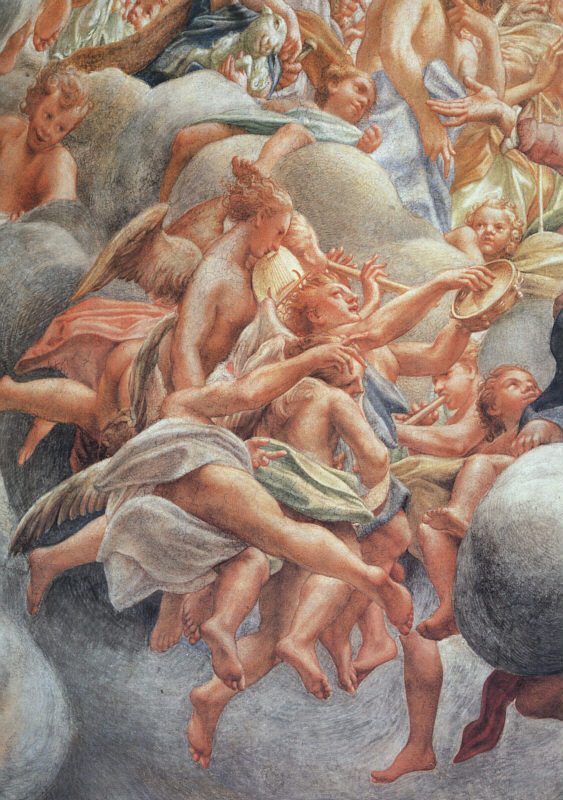This Week in Classical Music: December 28, 2020.New Year of 2021.Happy New Year to everyone and good riddance to 2020, which turned out to be quite a rotten year.That horrible virus turned everybody’s life upside down, and then, among the losses and deprivation, the social madness took over.Now that the vaccine is here and being deployed, albeit slowly, there’s no way 2021 could be as crazy as 2020.Compared to the general mayhem and tragedies, little personal peeves don’t count for much; but we do have one disappointment, even if a minor one: for a number of years, we’ve been celebrating the holiday season playing parts of Bach’s Christmas Oratorio, and have been looking forward to playing more.But all good things come to an end, and this year we’ll be playing the last part of it, Part VI, which Bach composed for the day of Epiphany.In 1635, when it was performed, Epiphany was celebrated on January 6th.Even though the church calendar has become a bit more complicated since then, the 2021 Epiphany is still be celebrated on January 6th.
We know that Bach recycled many of his earlier cantatas, sometimes the secular ones, into the Christmas Oratorio, but the music written for the Epiphany was original, though even here there is a caveat: the very first choir probably came from a cantata written by Bach in 1631 to celebrate the birthday of one Joachim Friedrich von Flemming, a nobleman and governor of Leipzig.Only this chorus of the older cantata exists in this recycled form, the rest of the music was lost.The leading cheerful line of the original text, So kämpfet nur, ihr muntern Töne, (So fight, you lively tones) became a much more somber (and strange, we have to admit) Herr, wenn die stolzen Feinde schnauben (Lord, when our insolent enemies snarl), although the music stayed quite lively.In any event, the resulting cantata, the sixth part of the Christmas Oratorio, is a delight, and you can listen to it here, as performed by the English Baroque Soloists and the Monteverdi Choir under the direction of John Eliot Gardiner.
New Year 2021
This Week in Classical Music: December 28, 2020. New Year of 2021. Happy New Year to everyone and good riddance to 2020, which turned out to be quite a rotten year. That horrible virus turned everybody’s life upside down, and then, among the losses and deprivation, the social madness took over. Now that the vaccine is here and being deployed, albeit slowly, there’s no way 2021 could be as crazy as 2020. Compared to the general mayhem and tragedies, little personal peeves don’t count for much; but we do have one disappointment, even if a minor one: for a number of years, we’ve been celebrating the holiday season playing parts of Bach’s Christmas Oratorio, and have been looking forward to playing more. But all good things come to an end, and this year we’ll be playing the last part of it, Part VI, which Bach composed for the day of Epiphany. In 1635, when it was performed, Epiphany was celebrated on January 6th. Even though the church calendar has become a bit more complicated since then, the 2021 Epiphany is still be celebrated on January 6th.
virus turned everybody’s life upside down, and then, among the losses and deprivation, the social madness took over. Now that the vaccine is here and being deployed, albeit slowly, there’s no way 2021 could be as crazy as 2020. Compared to the general mayhem and tragedies, little personal peeves don’t count for much; but we do have one disappointment, even if a minor one: for a number of years, we’ve been celebrating the holiday season playing parts of Bach’s Christmas Oratorio, and have been looking forward to playing more. But all good things come to an end, and this year we’ll be playing the last part of it, Part VI, which Bach composed for the day of Epiphany. In 1635, when it was performed, Epiphany was celebrated on January 6th. Even though the church calendar has become a bit more complicated since then, the 2021 Epiphany is still be celebrated on January 6th.
We know that Bach recycled many of his earlier cantatas, sometimes the secular ones, into the Christmas Oratorio, but the music written for the Epiphany was original, though even here there is a caveat: the very first choir probably came from a cantata written by Bach in 1631 to celebrate the birthday of one Joachim Friedrich von Flemming, a nobleman and governor of Leipzig. Only this chorus of the older cantata exists in this recycled form, the rest of the music was lost. The leading cheerful line of the original text, So kämpfet nur, ihr muntern Töne, (So fight, you lively tones) became a much more somber (and strange, we have to admit) Herr, wenn die stolzen Feinde schnauben (Lord, when our insolent enemies snarl), although the music stayed quite lively. In any event, the resulting cantata, the sixth part of the Christmas Oratorio, is a delight, and you can listen to it here, as performed by the English Baroque Soloists and the Monteverdi Choir under the direction of John Eliot Gardiner.
Happy New Year!